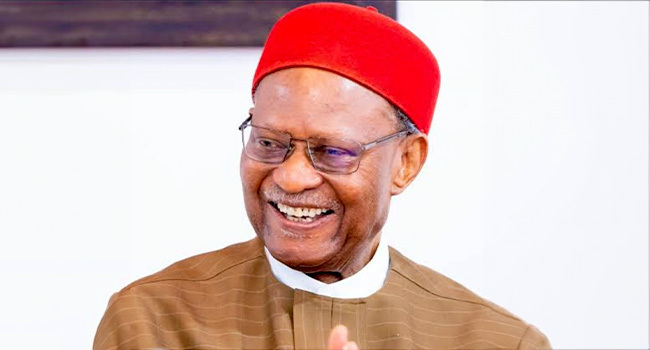Early Life and Background
Birth and Family Origins
Chief Emeka Anyaoku was born on January 18, 1933, in Obosi, Nigeria. His father, Emmanuel Chukwuemeka Anyaoku, was educated to middle school level and worked with the railways and in a hospital before becoming a catechist and later a village head. His mother, Cecilia Adiba Ogbogu, married Emmanuel after his first wife's death and came from a well-educated family. Emeka has five siblings.
Education
Primary and Secondary Education
Anyaoku began his education in a rural school in Umuahia and later attended CMS Central School in Agbor. For secondary education, he went to the Merchants of Light School (MOLS) in Oba, a boarding school where he was recognized for his intelligence, leadership qualities, and interpersonal skills.
Higher Education
After excelling in his secondary education, Anyaoku taught at Emmanuel College, Owerri, before attending University College Ibadan, where he studied Classics and was actively involved in student union leadership. He graduated in 1959 with an Honours Degree in Classics from the University of London.
Early Career
Commonwealth Development Corporation
In 1959, Anyaoku joined the Commonwealth Development Corporation (CDC) in Lagos. He trained at the CDC headquarters in London and attended a course at the Royal Institute for Public Administration. Following Nigeria's independence in 1960, he returned to the CDC's West Africa regional office in Lagos.
Contributions and Recognition
International Diplomatic Career
Chief Emeka Anyaoku is best known for his role as the third Commonwealth Secretary-General. He has had a distinguished career in diplomacy and continues to serve as the Ichie Adazie of Obosi, a traditional chieftaincy role in his hometown.
Personal Attributes and Legacy
Anyaoku's early years were marked by his academic excellence, leadership, and strong interpersonal skills, which paved the way for his successful career in diplomacy and public service. His legacy includes significant contributions to the Commonwealth and his enduring role in promoting Nigerian culture and education.
Marriage
Meeting and Wedding
In December 1961, Emeka Anyaoku, then a CDC Executive Officer, met Princess Ebunola Olubunmi Solanke at a bachelor's eve party he and his flatmate hosted in Lagos. Princess Bunmi, a Yoruba lady, was educated in England at St. Mary's School, Hastings, and Pitman College, London. Emeka and Bunmi were married at the Anglican Cathedral Church in Lagos on November 10, 1962.
Career
Commonwealth Development Corporation
In 1959, Emeka Anyaoku joined the Commonwealth Development Corporation (CDC). In early 1962, he met the Nigerian Prime Minister, Sir Abubakar Tafawa Balewa, who was impressed by Anyaoku's knowledge and persuaded him to join the Nigerian Foreign Service. After a rigorous interview, Anyaoku was appointed in April 1962 and soon became the Personal Assistant to the Permanent Secretary of the Ministry for External Affairs, contributing to the establishment of the Organisation for African Unity (OAU) in May 1963.
United Nations Posting
In July 1963, Anyaoku was posted to Nigeria's Permanent Mission to the United Nations in New York. He played a significant role in drafting a resolution for a trust fund to aid political detainees in South Africa. He was also active in addressing the Rhodesia Unilateral Declaration of Independence crisis.
Commonwealth Secretariat
In 1966, Anyaoku joined the Commonwealth Secretariat as Assistant Director of International Affairs. Despite attempts by the Nigerian military government to recall him, he continued his work and was elected Deputy Secretary-General in 1977. He briefly served as Nigeria's Foreign Minister in 1983 before returning to his position at the Commonwealth Secretariat after a military coup.
Secretary-General of the Commonwealth
On October 24, 1989, Anyaoku was elected the third Commonwealth Secretary-General at the Commonwealth Heads of Government Meeting in Kuala Lumpur. He was re-elected in 1993 for a second term. During his tenure, he was instrumental in promoting democracy and good governance, notably in South Africa's transition from apartheid.
Recognition and Legacy
Anyaoku was honored for his contributions to South Africa's transition, addressing a joint sitting of the South African Parliament in 1998. He initiated Commonwealth observer groups for elections, intervened in various political crises, and promoted democracy across Commonwealth nations. He retired on March 31, 2000, and was awarded numerous honors, including the Honorary Knight Grand Cross of the Royal Victorian Order (GCVO) by Queen Elizabeth II.
Post-Retirement
Continued Contributions
After retirement, Anyaoku continued to contribute to global governance and democracy. The University of London established the Emeka Anyaoku Professor of Commonwealth Studies in his honor. He received many accolades, including the Freedom of the City of London and the highest civilian honors from several countries. Anyaoku played a crucial role in ensuring a peaceful electoral process in Nigeria's 2015 presidential election.
Publications and Honors
Anyaoku is a published author with 33 honorary Doctorate degrees from universities worldwide. He served as Chairman of the Presidential Advisory Council on International Relations in Nigeria from 2000 to 2015, playing a significant role in Nigeria's democratic processes.
